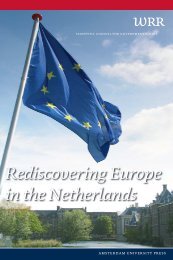The Western Condition - St Antony's College - University of Oxford
The Western Condition - St Antony's College - University of Oxford
The Western Condition - St Antony's College - University of Oxford
Create successful ePaper yourself
Turn your PDF publications into a flip-book with our unique Google optimized e-Paper software.
<strong>The</strong> <strong>Western</strong> <strong>Condition</strong>: Turkey, the US and the EU in the New Middle East<br />
and Austria to see its continued implementation by Turkey before agreeing to any visa relaxation;<br />
an open-ended commitment that the Turkish government understandably objects to. Such<br />
apprehension reflects the socially entrenched stereotypes in these countries about Turkey, which<br />
still depict it as an agrarian society where impoverished masses look for an opportunity to<br />
migrate to Europe. In fact, very few <strong>of</strong> the immigrants who land in Europe via Turkey are<br />
Turkish citizens. Unlike in the 1960s, when thousands <strong>of</strong> Turkish ‘guest workers’ arrived in<br />
Europe to assist in post-war reconstruction, Turkish citizens no longer predominantly seek<br />
livelihood outside <strong>of</strong> Turkey. As such, there is an urgent need for the Turkish government and<br />
civil society organisations to work in collaboration with their European counterparts to challenge<br />
these stereotypes and educate sceptical publics about the large scale socio-economic change that<br />
has occurred in Turkey since the 1960s. 178<br />
<strong>The</strong> Turkish – European engagement would also benefit from a revision and strengthening <strong>of</strong><br />
relations between Turkey and individual member states. Greece is a particularly important case<br />
that stands out in this respect. <strong>The</strong> socio-economic crisis in that country has deeply challenged<br />
the legitimacy <strong>of</strong> its political establishment, leading in particular to the rise <strong>of</strong> a violently<br />
xenophobic neo-fascist movement, known as ‘Golden Dawn’, which has 18 seats in the Greek<br />
parliament and alleged links to the police force. While Golden Dawn is still a minor party in a<br />
relatively peripheral EU country, the fertile ground on which the extreme right has been rising<br />
across the continent represents a more existential challenge to the future <strong>of</strong> the liberal European<br />
project than the fate <strong>of</strong> its single currency. At the same time, the movement’s brazen anti-<br />
Muslim and anti-Turkish rhetoric threatens to provoke nationalist sentiments across the Aegean,<br />
putting the relative stability Greece and Turkey have enjoyed since the late 1990s into<br />
jeopardy. 179<br />
Turkey thus has more than just economic interest in seeing its neighbour move out <strong>of</strong> the<br />
crisis. 180 Having survived its own socio-economic crises just over a decade ago, Turkey is also in<br />
a position to assist Greece in this endeavour and use the current situation as an opportunity to<br />
strengthen bilateral ties. In 2011, Turkey surpassed Germany as Greece’s second largest trade<br />
partner. 181 While economic and cultural relations between the two countries are more extensive<br />
than at any point in the two republics’ histories, they can still be improved. Further adjustments<br />
to the bilateral visa regime that would make it easier for Turkish citizens to visit Greece and a<br />
demonstration <strong>of</strong> increased commitment by the Turkish government to address the issue <strong>of</strong><br />
illegal migration, in which Greece is the primary entry point into Europe, could draw the two<br />
178 See Seçil Paçacı Elitok and Thomas <strong>St</strong>raubhaar (eds) Turkey, Migration and the EU: Potentials, Challenges and<br />
Opportunities (Hamburg: Hamburg <strong>University</strong> Press, 2012).<br />
179 ‘Greek 'Führer' vows to ‘take back İzmir' after Istanbul’, Hurriyet Daily News, 15 June 2012.<br />
180 Şahin Alpay, ‘Time for Turkey and Greece to draw closer’, Today’s Zaman, 26 February 2012.<br />
181 ‘Turkey becoming Greece’s No 2 trading partner: Official’, Hurriyet Daily News, 15 October 2012.<br />
67

















